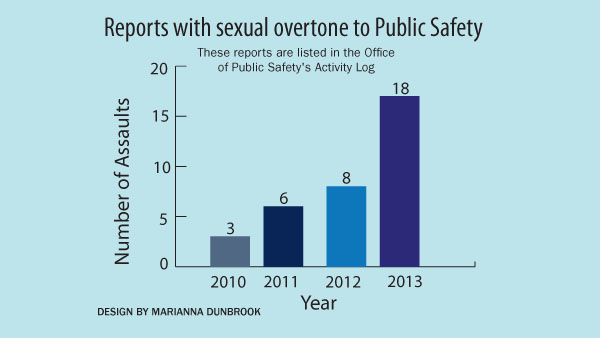With a sexual assault reported in Ithaca College’s East Tower on Feb. 3 and sexual offenses in the national spotlight, the college is proactively working to educate the campus community on these issues.
Data from the Office of Public Safety and Emergency Management at the college shows consistently low numbers in reported sexual offenses, while national statistics present higher numbers, with one in five women having been sexually assaulted in college, according to the White House Council on Women and Girls.
From 2007 to 2012, there have been an average of 2.5 reports of sexual offenses per year, according to the college’s Annual Security and Fire Safety Report. The annual report is part of a federal requirement, the Clery Act, for colleges that participate in federal financial aid to disclose information about their crime statistics on and off campus.
In 2010, there was only one report at the college, and 2011 saw the highest number of reports with four listed. Only cases that fit the Clery Act are listed in the report. This includes forcible rape, forcible sodomy, sexual assault with an object, forcible fondling, incest and statutory rape.
Terri Stewart, director of Public Safety, said the low numbers could signify these offenses often go unreported. She said this is a national problem, not one specific to the college.
“It’s not rocket science,” she said. “I think it is exactly what historically and traditionally it has been, people are afraid to report.”
Senior Lucia Brown, president of Feminists United, said the data is likely not an accurate reflection of sex offenses that occur in the community.
“Just because 2.5 reports are made a year does not mean that is representative of how many assaults actually happen,” she said. “It’s very challenging for victims to report what’s happened to them, and I think they are not always aware of the resources available to them.”
Since 2010, the number of reported cases with sexual overtones has consistently increased on the Public Safety Activity Log, a voluntary report of Public Safety’s significant activity and instances of fire, emergency medical services or police agency assistance on and off campus. The reports with sexual overtones are those that have any mention of “sex” in their description. In 2010, three cases were reported, but, in 2013, the number of reports spiked to 18.
Stewart said an increase in community awareness and knowledge of available resources could’ve affected the rise in reports.
“When you start educating people, and they know what their resources are, and they understand it better, then the number of incidents reported should go up,” Stewart said. “So that is a good thing.”
In 2011, the Dear Colleagues Letter, which is periodically released by the U.S. Department of Education’s Office of Civil Rights, prompted institutions to revise their policies to fully follow new Title IX requirements. President Barack Obama’s reauthorization of the Violence Against Women Reauthorization Act in 2013 and the recent creation of the White House Task Force on Protecting Students From Sexual Assault reinforce national efforts to combat sexual assault.
In the last few years, Public Safety has been more cognizant of what cases fit Title IX, and officers have been trying to extrapolate more information from complainants to determine this, Stewart said. Officers have also been distributing more information to reported victims about local resources.
Mike Leary, assistant director of judicial affairs, said in 2008 a task force was organized after students raised concerns about how sexual offences were vaguely defined and handled in the Student Conduct Code. In 2009, the code was modified to define sexual assault, sexual abuse and sexual exploitation as the three categories classified as sexual misconduct. A chart listing the sanctions for each offense was also added. The chart is available upon request.
“If someone was found responsible for sexual assault, they would be suspended or expelled from the college,” Leary said.
To encourage students to identify and report sexual crimes, the College Advisory Committee on Campus Security and Campus Life has been developing a website since last semester, where all safety information will be compiled, Katelyn Madison, Class of 2014 senator and student representative in the committee, said. The website, she said, is meant to be a one-stop shop where students can get information about what to report, how to report and who to report possible crimes to. Stewart, who co-chairs the committee, said the website will be launched sometime this year.
The college Center for Counseling and Psychological Services offers assistance to sexual offense survivors including wellness groups that meet periodically. The Ithaca Advocacy Center also provides support, advocacy and education on sexual offenses and domestic violence. Tiffany Greco, education director at the Advocacy Center, said the organization helps an average of 1,500 local clients every year, including some college students.
Student organizations such as Feminists United have also been working toward the prevention of sexual offenses, Brown said. The group recently collaborated with the Ithaca Advocacy Center to offer “Bringing in the Bystander,” a national preventive campaign that trains people on being proactive witnesses, at the college.
“I think that [the college has] taken great steps, and our campus community is ahead of a lot of other campuses, but there is always more that can be done with providing resources,” Brown said.








